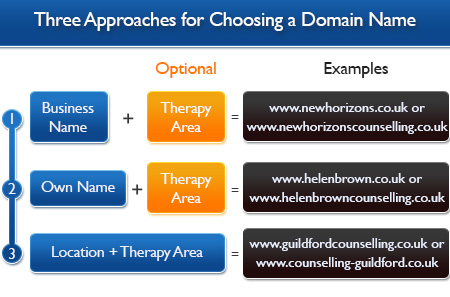Choosing a Domain Name
easy to follow step by step guides


When starting a new website, one of the decisions you'll need to make is what website address (or domain name) you want to use. Here's some advice on how to choose a good one.
This guide aims to help you choose a suitable domain name, or website address, for your WebHealer website. By a website address, we mean something like www.bbc.co.uk , which is how the BBC's website is known on the internet.
You may have something in mind already, particularly if you have a unique and catchy-sounding business name. Or you may not have considered it at all yet. In either case, there are a number of things to think about when choosing your domain name, including whether the name you want is available and what ending (eg .com, .co.uk etc) to use. In addition, as your domain name can impact on your search engine listings, you may want to incorporate words people may search for such as "counselling" or "reflexology", although the benefit of this is much less than many people think. Something that is very important regarding search engines, is that once you have chosen your website address, it is very unwise to change it as your website will disappear from Google (see later for more explanation.)
As it can all feel a little overwhelming, WebHealer have developed this EZ guide to help you work through the options and take all the important factors into consideration. The guide is divided into three sections, the first of which is aimed at helping you generate some candidate names by using one or more of WebHealer's suggested three approaches. Part two discusses the factors and caveats to consider before deciding to go ahead with any particular candidate, and then some final considerations are discussed in part three.

When helping clients come up with options or candidates for their website domain name, WebHealer use the 3 approaches illustrated in Figure 1 above. If you have a business name, then incorporating this into your domain name can be a good idea, particularly if your business name is well known (eg on your stationary, familar to your existing clients etc.). Business names are often short, snappy and easy to remember, and therefore are good to use for your website address, as it reinforces people's memory of it.
If you don't have a business name, then it's likely you work under your own name, as many therapists do (so essentially your name is also your business name). Therefore another approach is to use a domain name that includes your name, which can work well and look professional.
The third approach, represented by the third blue box in the diagram is to use neither your name nor your business name, but to create a name based on words people may search for. So, for example, if you offer homeopathy in Guildford, then a name like homeopathyguildford.co.uk would be worth considering. The advantage of this approach is that it will give you a little extra boost on the search engines for searches that include these two words. Such a name may be described as a keyword rich name, and it is also possible to make options 1 and 2 more keyword rich, by for example choosing helenbrowncounselling.co.uk instead of just helenbrown.co.uk. You may also adopt this keyword rich enhancement technique as a means to obtain a name that is available, as helenbrown.co.uk was secured by someone in March 2000, and most name based website addresses are also no longer available.
One caveat to make about the keyword rich technique is that the search engine benefit it gives is less than many people think, and there are downsides which are explained in the next section. Incidentally although we've been talking about names like helenbrown.co.uk rather than www.helenbrown.co.uk, don't worry about the www prefix, as it is standard for website addresses to prefix with www, though anyone typing in your address without the www prefix will get redirected to the main one that includes www.
Once suitable candidates have been identified using the approaches above, we strongly recommend testing them against the criteria in part 2 of this guide, to determine the suitability, advantages and disadvantages of any particular name.
Once you have a short list of candidate names that appeal, here are a few important checks to ensure you make a suitable final choice. Note that they are listed in order of importance.
There are other factors too, such as choice of ending (.com, .co.uk etc) but we recommend prioritising your choices against this list first. By the way, if you find that you really like more than one name, or want to secure more than one name, it is possible on the WebHealer system to have up to 5 domain names for your website, although only one is considered the primary address (see section 3). So don't worry about that just now, as it is still makes sense to run these checks and prioritise them.
 We recommend that you draw up a table with the candidate names you selected in part one. Just brainstorm ideas and don't worry about suitability. Then make a column for each of the above 3 factors, and score each candidate. We've made a fictitious case study example to illustrate. Have a quick look now, then read through the explanations below, before returning to look more closely at the case study.
We recommend that you draw up a table with the candidate names you selected in part one. Just brainstorm ideas and don't worry about suitability. Then make a column for each of the above 3 factors, and score each candidate. We've made a fictitious case study example to illustrate. Have a quick look now, then read through the explanations below, before returning to look more closely at the case study.
 It's very important to choose a name that ideally you won't need to change during the lifetime of your website. Why? Apart from a small cost implication, the main reason is that changing the name at a later date can impact very badly on where your website is listed on Google (and other search engines).
It's very important to choose a name that ideally you won't need to change during the lifetime of your website. Why? Apart from a small cost implication, the main reason is that changing the name at a later date can impact very badly on where your website is listed on Google (and other search engines).
A website is known to search engines by its website address, and throughout the period your website is live with our service, we will be building up its good standing with them - Google has a technical term for "good standing" which they call PageRank, and if other factors are equal a website with more PageRank will list above those with a lower one. Just like a good restaurant takes years to build a reputation (see our Waiting for Google EZ guide), a website develops good standing over time. So if you ran an increasingly effective website for, say 6 months, and then were forced to change it's name, you would throw away 6 months of investment in working your way up the Google listings. And just imagine if you changed it after 5 years! Visualise a game of snakes and ladders. The 3 most common scenarious which force clients to change their domain name are:
Considering location first, if for example you are a counsellor in Milton Keynes, then a name like counsellingmiltonkeynes.co.uk will give you a little extra boost on the search engines compared with say a name like joebloggs.co.uk. However if you were to move location in a few years time to Norwich, your website name will no longer make sense and you will want to change it. Alternatively, you may set up a second practice location. For example you continue to pratice for part of the week in Milton Keynes, but the rest of the week in Northampton, which makes your website address offputting for potential clients in Northampton.
This can also happen with therapies. If you launch your WebHealer website with the name reflexologywimbledon.co.uk, but later train as a reiki practioner and also want to promote reiki via your website, then your existing name may not encourage potential reiki clients to contact you as they may see you as a reflexology specialist.
Therefore, if you know that your therapy focus and location won't change over time, then there are advantages to a key word rich name because of the slight extra search benefits. However many WebHealer clients with no key words at all in their domain name are still on page 1 of Google, so its important not to overstate the benefits of this.
Even the use of your own name or business name should not be done without thinking through potential changes - for example many women change their name because of marriage or after a divorce. In addition, sometime people may decide to re-brand and as a result change their business name.
As you can see, almost every element of the name may change, so you need to consider the likelihood of changes, and choose accordingly. Whilst scoring your candidate names against this suitability factor, you may decide to add new ones. For example if you had wanted miltonkeynescounselling.co.uk, but there is a possibility of practicing elsewhere you may instead consider joebloggscounselling.co.uk.
 Many people first hear about a website through word of mouth or reading it off a business card or stationary. So, if your potential client has difficulty remembering or spelling your website address you could lose out on an opportunity. This means that simple names are the best, and easy to spell names should ensure more visitors to your website than difficult names. Also very long names, even if they are simple and memorable can be hard to type in without a mistake.
Many people first hear about a website through word of mouth or reading it off a business card or stationary. So, if your potential client has difficulty remembering or spelling your website address you could lose out on an opportunity. This means that simple names are the best, and easy to spell names should ensure more visitors to your website than difficult names. Also very long names, even if they are simple and memorable can be hard to type in without a mistake.
One technique is to use initials. For example if you want to use your own name, and most people struggle to spell it, you might want to consider using your own initials - e.g abreflexology.co.uk is easy to convey.
 The final suitability factor is how keyword rich your candidate name is. We've already mentioned the risks of this approach a few times, but if it is appropriate to include a word that people are likely to search for when looking for you, then including it will give a little extra boost to your position on Google. Counselling is a good example, as most counsellors have this as a single discipline that is very unlikely to change.
The final suitability factor is how keyword rich your candidate name is. We've already mentioned the risks of this approach a few times, but if it is appropriate to include a word that people are likely to search for when looking for you, then including it will give a little extra boost to your position on Google. Counselling is a good example, as most counsellors have this as a single discipline that is very unlikely to change.
Now that you have a prioritised list, you are almost ready to let the WebHealer team know your final choice. There are just a couple of small things to be aware of, particularly if you have little experience of websites.
Domain names can only include alphabetical letters, the digits from 0 through 9 and dashes (i.e. - ). No other characters, eg spaces, ampersands (ie &), or brackets are allowed. So for example if your business is called Jones & Jones, you would not be able to have a website address of www.jones&jones.co.uk. Instead you would need to choose something like www.jones-and-jones.co.uk.
On a related subject the domain name system does not recognise capital letters so be careful around certain words. A good idea is to write it down all in lower case as a final check - www.JoeBloggsTherapist.com may look ok, but with no capitals, it could be seen as www.JoeBloggsTheRapist.com. Of course www.joebloggstherapy.com would have no such double meaning!
At WebHealer, we can manage domain names on your behalf if they end in
It will make no difference what ending your domain name has, as far as eg Google is concerned. So a .co.uk or .com won't get you a higher or lower listing on the search engines. Therefore the ending you choose might depend more on how your potential clients perceive it. For example, you can only own a .co.uk name if you have a UK address and therefore this ending tells visitors that you are very likely to be UK based, whereas a .com or a .net name may be better for those wanting to target clients overseas as well as in the UK, because people abroad will be less familiar with .co.uk names, and may not visit the website because of it.
More importantly, do bear in mind that a .co.uk or a .org.uk ending can cause problems if you intend to move abroad (ie away from the UK) while your website is active. This is because for a .uk ending, you need to be based in the UK for domain registration reasons. In this case, we would recommend choosing a name ending in .com , .net or .org. instead.
Once you have some domain candidates that have passed the above criteria, our support department can check if these are available for you, as just because you may not be able to find a website attached to a name, it does not mean that the name has not been taken. Names can simply be registered, which prevents others from taking them, without being associated with a website.
Many business name related domains, and domains based on your own name, may have already been snapped up by someone else, so may not be available to use. There are however many creative ways around this. For example you could include your therapy in the name, use dashes or numbers to separate the words and/or use a different ending. By way of illustration, if janebrown.co.uk has already been taken you may want to consider something like janebrownreflexology.co.uk. Not only is this name more likley to be available, having the key word "reflexology" in the name, also makes it slightly more search engine friendly.
Another example would be instead of "GoodToTalk.co.uk", using "GoodToTalkCounselling.co.uk" or "Good-2-Talk.co.uk" or the .com or .net ending of the name eg "GoodToTalk.net"
 A final point for consideration is that it is possible to have more than one website address.
A final point for consideration is that it is possible to have more than one website address.
There are several reasons for doing this:
By way of an example, you may have a well established therapy practice in Milton Keynes called "See The Light", and are very keen to secure the obvious website address www.seethelight.co.uk. However, you also want every advantage possible for promotion on Google, and want to use www.counsellingmiltonkeynes.co.uk. In this case you could sign up to our dual domain hosting package. This costs slightly more, but allows you to make www.counsellingmiltonkeynes.co.uk your primary website address and have www.seethelight.co.uk on your business stationery. Both names would find your website if an enquirer entered either of them into their browser address bar, but we would focus our search engine promotion on www.counsellingmiltonkeynes.co.uk to get you the highest listing that we can.